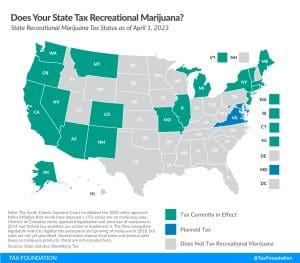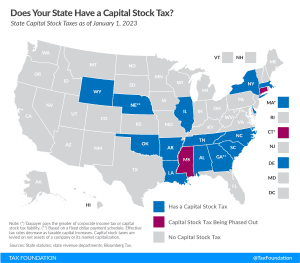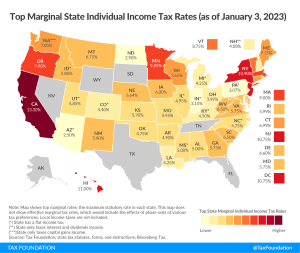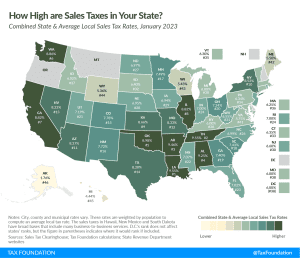Does Your State Tax Recreational Marijuana?
Recreational marijuana taxation is one of the hottest policy issues in the U.S. Currently, 21 states have implemented legislation to legalize and tax recreational marijuana sales.
5 min readHow does Connecticut’s tax code compare? Connecticut has a graduated state individual income tax, with rates ranging from 2.00 percent to 6.99 percent. Connecticut has a 7.5 percent corporate income tax rate. Connecticut also has a 6.35 percent state sales tax rate and does not have local sales taxes. Connecticut has a 1.78 percent effective property tax rate on owner-occupied housing value.
Connecticut has an estate tax. Connecticut has a 25 cents per gallon gas tax rate and a $4.35 cigarette excise tax rate. The State of Connecticut collects $9,469 in state and local tax collections per capita. Connecticut has $14,903 in state and local debt per capita and has a 58 percent funded ratio of public pension plans. Overall, Connecticut’s tax system ranks 47th on our 2024 State Business Tax Climate Index.
Each state’s tax code is a multifaceted system with many moving parts, and Connecticut is no exception. The first step towards understanding Connecticut’s tax code is knowing the basics. How does Connecticut collect tax revenue? Click the tabs below to learn more! You can also explore our state tax maps, which are compiled from our annual publication, Facts & Figures 2024: How Does Your State Compare?

Recreational marijuana taxation is one of the hottest policy issues in the U.S. Currently, 21 states have implemented legislation to legalize and tax recreational marijuana sales.
5 min read
The overall U.S. tax and transfer system is overwhelmingly progressive, and understanding the extent—and source—of that progressivity is essential for lawmakers considering the trade-offs associated with each tax policy decision.
23 min read
As housing prices are rapidly increasing, and property tax bills along with them, the property tax has come into the spotlight in many states. The design of a state’s property tax system can affect how attractive that state is to businesses and residents.
9 min read
Facts & Figures serves as a one-stop state tax data resource that compares all 50 states on over 40 measures of tax rates, collections, burdens, and more.
2 min read
States can better position themselves for success by moving away from economically-damaging taxes like the capital stock tax.
4 min read
Individual income taxes are a major source of state government revenue, accounting for more than a third of state tax collections:
9 min read
Despite robust revenues, some state lawmakers are champing at the bit to raise taxes on higher-income households, sometimes to extraordinary levels.
7 min read
If your state issued tax rebates last year, you might have to pay federal income tax on the rebate you received. Maybe. Who knows? Unfortunately, not the IRS—at least not yet.
5 min read
While many factors influence business location and investment decisions, sales taxes are something within policymakers’ control that can have immediate impacts.
11 min read
At the end of 2022, prices were 14.6 percent higher than they were two years prior. That’s the fastest inflation rate over any two calendar years since the stagflation era of the late 1970s. State policymakers are understandably interested in bringing any tools at their disposal to bear on the problem. And many of them are reaching for tax policy solutions.
7 min read